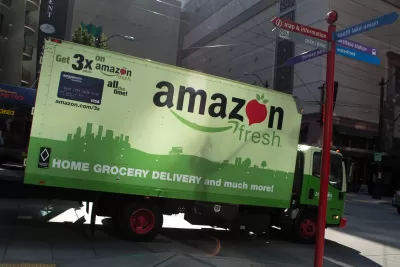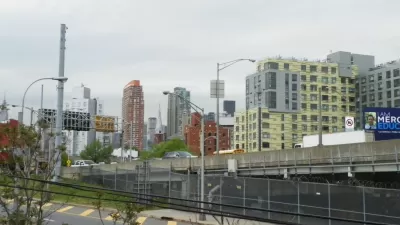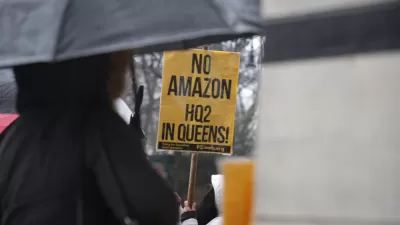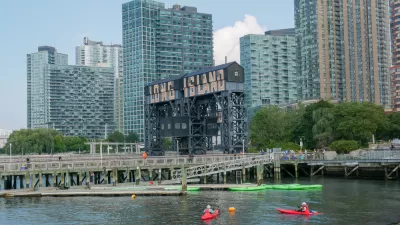Amazon is placeless. The company doesn't have a physical presence, create jobs, or pay taxes in most of the places where it does business — and it's having a profound impact on the health of cities and towns, a new report finds.

As Amazon upends the longstanding relationship between commerce and place, it's also increasingly threatening the revenue streams and social capital that cities and towns depend on to function, finds a new report from the Institute for Local Self-Reliance. Among the report's findings are:
- Amazon's rise has played a key role in the wave of retail vacancies and dying malls that's sweeping the country. By the end of 2015, Amazon's growing market share had caused more than 135 million square feet of retail space to become vacant, ILSR's analysis estimates.
- Property taxes are the largest single source of state and local revenue to fund schools, roads, libraries, and other services, and a disproportionate share of this revenue — on average, half — comes from commercial properties. Amazon, however, doesn't pay property taxes on prime commercial properties, and in 20 states, doesn't have property at all.
- As Amazon becomes more dominant, the number of local, independent retail businesses is declining, and the U.S. economy is becoming less entrepreneurial overall.
This has serious impacts for communities: Local business ownership is a critical source of community benefits that include increased levels of political participation, social capital, and well-being, as measured by metrics ranging from voter turnout to number of civic associations per capita. Despite these urgent implications, elected officials haven't yet begun to grapple with the company's rise — and, in fact, are fueling Amazon's expansion by doling out subsidies and tax favors worth hundreds of millions of dollars. Of 77 large fulfillment facilities that Amazon built in the U.S. between 2005 and 2014, the company received public subsidies on more than half, with a combined value of at least $613 million, the report finds. On top of this, the company still does not collect sales tax in 16 states, and it uses elaborate tax schemes to further lower its tax rate, one of which is leading the IRS to pursue it for $1.5 billion in back taxes. The report, "Amazon’s Stranglehold: How the Company’s Tightening Grip is Stifling Competition, Eroding Jobs, and Threatening Communities," also examines the company's impact on competition and entrepreneurship, and on jobs and wages, and sketches the steps policymakers at the federal, state, and local levels should take to check the company's power and bring about a more competitive and equitable economy. Continue reading at the link below.

Maui's Vacation Rental Debate Turns Ugly
Verbal attacks, misinformation campaigns and fistfights plague a high-stakes debate to convert thousands of vacation rentals into long-term housing.

Planetizen Federal Action Tracker
A weekly monitor of how Trump’s orders and actions are impacting planners and planning in America.

San Francisco Suspends Traffic Calming Amidst Record Deaths
Citing “a challenging fiscal landscape,” the city will cease the program on the heels of 42 traffic deaths, including 24 pedestrians.

Adaptive Reuse Will Create Housing in a Suburban Texas Strip Mall
A developer is reimagining a strip mall property as a mixed-use complex with housing and retail.

Study: Anti-Homelessness Laws Don’t Work
Research shows that punitive measures that criminalized unhoused people don’t help reduce homelessness.

In U.S., Urban Gondolas Face Uphill Battle
Cities in Latin America and Europe have embraced aerial transitways — AKA gondolas — as sustainable, convenient urban transport, especially in tricky geographies. American cities have yet to catch up.
Urban Design for Planners 1: Software Tools
This six-course series explores essential urban design concepts using open source software and equips planners with the tools they need to participate fully in the urban design process.
Planning for Universal Design
Learn the tools for implementing Universal Design in planning regulations.
Heyer Gruel & Associates PA
JM Goldson LLC
Custer County Colorado
City of Camden Redevelopment Agency
City of Astoria
Transportation Research & Education Center (TREC) at Portland State University
Jefferson Parish Government
Camden Redevelopment Agency
City of Claremont





























